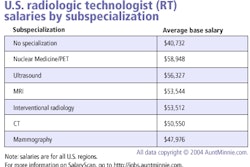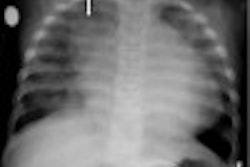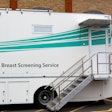A radiology group in southwest Florida has agreed to pay the U.S. government more than $2.53 million to settle allegations that it filed false Medicare claims -- allegations first lodged in a whistleblower lawsuit by the practice's former Medicare coding supervisor.
Radiology Regional Center, a 27-radiologist group with eight freestanding centers and administrative offices in Fort Myers, FL, is the latest of several radiology practices examined by federal officials in recent years for alleged coding or test-ordering violations. In one of those cases, three radiology practices in Cumberland, MD, were involved in a settlement last year, according to a press release by the U.S. Department of Justice (DOJ).
In a press release issued last week, the Department of Justice alleged that the Florida RRC group "knowingly submitted claims to Medicare for which it was not entitled to payment." A DOJ spokesman declined to comment beyond what appeared in the settlement agreement.
However, RRC admitted no wrongdoing in choosing to settle with the government, emphasized practice administrator Brad Reid. Fighting the allegations in such cases isn't a feasible option, Reid said, explaining the group's decision to settle.
"You work closely with the government to address as many of the concerns that are raised as possible, and when you've taken that as far as it can be taken, then you talk about how to put the issue behind you," he said.
In the settlement agreement, the government cited the following contentions of allegedly inappropriate billing by RRC:
- For exams not ordered by the patient's treating physicians or otherwise not reimbursable, specifically retroperitoneal ultrasounds (CPT Code 76770) and MRI exams of the orbit, face and neck (70540).
- For certain mammograms (76090 and 76091) that did not qualify as diagnostic mammograms, and, instead, should have been billed as screening mammograms (76092).
- For noninvasive physiologic studies of extracranial arteries (93875) or extremity veins (93965) and same-day duplex scans of the same anatomy (93880, 93970, and 93971), when they should have billed for only the more complex procedure.
- For reconstruction procedures (76375) which were not ordered by the patient's treating physicians or were otherwise not reimbursable.
While declining to respond in detail to all of the allegations, Reid noted that RRC had bolstered its efforts for documentation in situations where the group had previously been lax, like when patients showed up for exams without the script from their treating physician.
"We've got procedures in place now that are compliant with Medicare rules, particularly in terms of documenting the original verbal order when the physician office calls to schedule," Reid said. "I've been in the business for 30 years, and these are the same kinds of issues that every group struggles with every day."
Reid also said that the alleged violations were "pretty old stuff," although the settlement agreement contended that some of the disputed conduct continued through 2003.
The allegations against the radiology group first arose in December 2000, when former RRC employee Suzan Walker filed a whistleblower lawsuit in the U.S. District Court for the Southern District of Florida in Fort Myers.
Walker had worked for RRC for 13 years until late 1999. She served as the practice's Medicare coding supervisor for 10 years, according to her lawsuit.
"During this 10-year period, (she) gained an extensive and detailed knowledge of the improprieties committed by RRC directors, officers, management, and employees related to illegal Medicare billing," according to her lawsuit, which was originally filed under seal but was recently made public.
In her lawsuit, Walker made many more allegations than ended up being cited by the government, which intervened in her civil case in January. Citing 56 specific types of violations, she alleged that Medicare was paying RRC around $750,000 per month based on false claims, totaling up to $54 million over a period beginning in 1994.
Walker will receive $443,000 from the settlement for her role as a "qui tam relator," or whistleblower, in the case. Under the federal False Claims Act, she was eligible for up to 25% of the government's recovery.
RRC will also pay Walker $85,500 for her attorney's fees and expenses related to her original whistleblower lawsuit.
Reid, who joined RRC after Walker filed her whistleblower lawsuit against the group in 2000, declined to discuss the former employee's role in the case.
From an outsider's perspective, however, "there is some significant irony in the fact that the person who brought the complaint was responsible for the coding activity being complained of," noted Thomas Greeson, a Washington, DC, attorney who has represented other radiology practices in similar cases.
The payments to Walker show the federal government wants to encourage whistleblowers to bring forward complaints of alleged Medicare fraud, Greeson said.
"The government is going to try to take advantage of allegations of tests performed without a treating physician order, and allegations of upcoding or miscoding," he said.
"The lesson for radiologists is they practice in a complex regulatory environment," noted Greeson. "They need to know and understand the rules, have coders who understand those coding rules, and do the best they can with respect to their compliance activity."
By Tracie L. ThompsonAuntMinnie.com staff writer
June 29, 2004
Related Reading
Automated claim coding pays off in time and money, May 11, 2004
Diligent coding means money in the bank for breast imaging, May 21, 2004
Billing mistakes cost Medicare $11.6 billion, U.S. says, November 17, 2003
Part I: Coding and reimbursement tips and traps for radiology, October 30, 2003
Demystifying the internal auditing program, October 16, 2002
Copyright © 2004 AuntMinnie.com



















